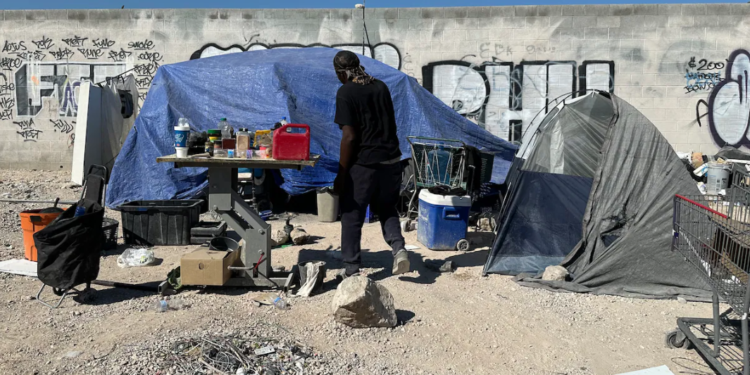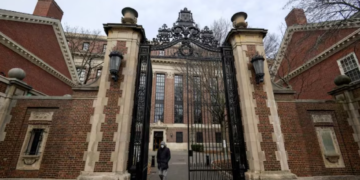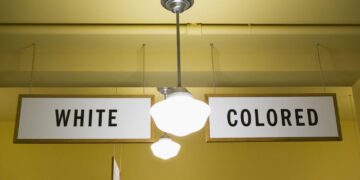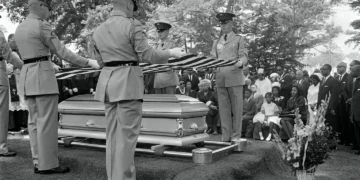Dec 26, 2024 Story by: Publisher
Maurice Clark sat in his tent by the railroad tracks as two outreach workers began asking him questions to assess his eligibility for free or subsidized housing.
They asked about his drug use, criminal history, hospital visits, experiences with street violence, and whether he had ever engaged in sex for money. Clark, uncomfortable with their questions and the presence of police officers accompanying the surveyors, struggled to be fully honest.
“I’ve done some crazy things to survive, but I’m, like, I’m going to say no because there’s these officers right there,” Clark recalled, reflecting on that fall afternoon outside his tent. “I’m a Black man in America, so asking this stuff hits a little bit different.”
Homelessness experts and local leaders agree that such intrusive questions deepen racial disparities among the homeless population, particularly as more individuals struggle to access limited taxpayer-funded housing amid the affordability crisis.
These vulnerability questionnaires are designed to assess a person’s likelihood of serious illness or death while homeless and help prioritize who gets housing. However, the system, adopted across the nation, disproportionately benefits white homeless people. It awards higher scores to those with frequent healthcare usage—something that is more common among white homeless individuals—placing them ahead of their Black counterparts in the housing queue.
Black Americans make up 13.7% of the U.S. population but represent 32.2% of the homeless population, while white people, including those of Hispanic descent, make up 55% of the homeless population, despite comprising 75% of the overall U.S. population.
“It’s racist in a systematic way,” said Marc Dones, policy director at the University of California-San Francisco, and lead researcher for one of the nation’s largest studies on Black homelessness. “If you’re a white person, the more likely you are to rank higher than if you’re a Black person, so you’re more likely to get selected for housing.”
The practice began after President Barack Obama signed into law measures in 2009 requiring local homelessness agencies to implement methods for assessing vulnerability to receive federal housing funding. Many cities adopted the VI-SPDAT survey, which is still widely used despite its racial bias.
Some experts believe it is time to abandon these assessments and instead consider systemic racism, poverty, criminal justice involvement, and other economic factors when evaluating homelessness. Certain communities are already adjusting their systems to reduce racial disparities and improve housing access for Black individuals.
In Los Angeles, officials are exploring artificial intelligence to better assess priority, incorporating issues like over-policing of Black communities and healthcare discrimination. In Las Vegas, officials are revising the questionnaire to prioritize systemic issues like incarceration, and in Austin, Texas, a new system is being tested to address gentrification-related displacement.
“We need to own the racism that is embedded in our systems,” said Quiana Fisher, vice president of homelessness response systems in Travis County, Texas, which includes Austin. “It’s not just about the tool — it’s about funding, and it’s about program outcomes. Even if it’s unintentional, we have created a homeless response system that is rooted in racism.”
The questionnaire was initially piloted in Boston, where the homeless population was predominantly white, male, and had severe health issues. In contrast, Black homelessness is largely driven by economic factors like poverty and joblessness. These disparities mean Black individuals tend to score lower on the vulnerability assessment due to less access to healthcare and medical diagnoses, making it harder for them to qualify for housing.
“This whole system was piloted on this older white population in Boston, so it does a poor job of capturing the needs of Black folks, who don’t tend to be as sick as white folks — they’re more broke,” Dones said. “The initial thought was to prioritize these people because they’re going to die sooner. It was trying to tackle mortality, but it wound up in racism.”
As a result, white individuals are more likely to score higher on vulnerability assessments, particularly due to higher rates of chronic disease, addiction, and emergency room visits. Black people, meanwhile, are less likely to seek medical care, often due to medical racism.
Local leaders also highlight the economic disadvantages that contribute to higher rates of homelessness among Black Americans, including foster care placements and higher rates of eviction and joblessness. However, once homeless, securing stable housing becomes even more difficult.
In Los Angeles County, which has the largest homeless population in the U.S., Black people make up 31% of the homeless population, though they represent just 9% of the county’s total population. In Austin, Black people make up nearly 32% of the homeless population, while accounting for just 7.6% of the overall population. In Clark County, which includes Las Vegas, Black people represent 42% of the homeless population but only 12% of the total population.
“We’ve failed to capture the complex vulnerabilities of our marginalized groups. We’re asking all these questions, but we created a waiting list to nowhere,” said Brenda Barnes, head of the Southern Nevada Homelessness Continuum of Care.
Clark, 45, recently reflected on taking his housing questionnaire. Despite meeting several criteria for prioritization—homeless for nearly four years, without steady income, and frequent visits to emergency rooms—he was not selected for housing. He was asked about his criminal record, including a felony conviction for theft, which he says he didn’t commit, as well as his drug use and experiences of assault.
Clark withheld some details about his struggles, including his occasional engagement in sex work and his use of methamphetamine to stay alert at night. He was hesitant to be honest with outreach workers due to concerns about the consequences of sharing such personal information. “They asked me about drugs, I was like, um, I don’t know,” Clark said. “Like I’m supposed to tell them I got addicted to meth or sold my body for a meal and hotel room? I had no idea where this information was going or what it was being used for.” Despite answering the survey, he did not receive housing assistance.
John Harris, 59, who has also taken the housing questionnaire, has had a similar experience. Despite answering questions about his criminal background and health issues—including a high blood pressure reading—he was told his score wasn’t high enough to be prioritized for housing.
“I called and asked what happened with my housing. They said I didn’t score high enough,” Harris said. “No matter what society says today, things ain’t never going to change.”
The issues with vulnerability assessments go beyond the survey questions themselves. As pointed out by experts, the racial background of the surveyors is often mismatched with that of the individuals being questioned, which can lead to inaccurate or distrustful responses.
Some communities are working to adjust these assessments. Clark County has implemented a new system that assigns points for factors like whether someone has a substance use disorder, chronic illness, or a criminal background. This system aims to give more weight to factors affecting homeless people’s ability to find housing, such as a criminal record that might disqualify them from employment or housing opportunities.
Despite these changes, local officials remain uncertain about the future. “I don’t know what the solution is,” Barnes said. “To be honest, the numbers may spike again.”
Los Angeles County is also developing a new vulnerability tool that assigns more points for issues that disproportionately affect people of color, such as incarceration or drug use, particularly HIV, which affects Black men at a higher rate than other groups.
In Travis County, Texas, the new system includes higher scores for individuals displaced by gentrification, as well as for those with a history of criminal justice involvement. Fisher, who works in the county, emphasized that these adjustments are crucial to addressing the systemic issues behind homelessness.
Some experts suggest moving away from a standardized assessment tool altogether, instead allowing communities to tailor their housing approaches based on local demographics and needs.
“The solution is not necessarily in one tool,” said Mary Frances Kenion, vice president of the National Alliance to End Homelessness. “Communities can cultivate trust between homeless people and outreach workers through a one-on-one approach that better responds to individual needs.” Image Source: News Medical











![U.S. Attorney General Merrick Garland has announced that the Justice Department will be filing a lawsuit against Georgia’s election law, which introduces new restrictions on voting. [Ken Cedeno/Reuters]](https://blkpoliticsnow.com/wp-content/uploads/2024/10/ewterg-120x86.png)





